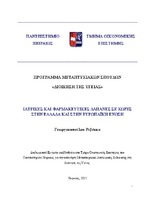Ιατρικές και φαρμακευτικές δαπάνες σε χώρες στην Ελλάδα και στην Ευρωπαϊκή Ένωση
Medical and pharmaceutical expenditures in Greece and European Union

Προβολή/
Λέξεις κλειδιά
Δαπάνες υγειονομικής περίθαλψης ; Νοσοκομειακές κλίνες ; Αριθμός ιατρών ; Βιώσιμες γεννήσεις ; Κατά κεφαλήν ΑΕΠ ; Προσδόκιμο ζωής στις γεννήσεις ; Δαπάνες ιατροτεχνολογικού τομέα ; Δαπάνες νοικοκυριών ; Healthcare expenditures ; Hospital beds ; Live births ; Life expectancy at birth ; GDP per capita ; Total capital investment expenditure on medical facilities ; Household ‘out of pocket’ spendingΠερίληψη
Στην παρούσα εργασία έγινε προσπάθεια να συσχετιστούν νοσοκομειακά δεδομένα με τις διάφορες κατηγορίες δαπανών υγείας. Οι δείκτες που μελετήθηκαν έδειξαν:
- Μείωση του αριθμού των κλινών (Hospital beds per 100000) μεταξύ 2001 και 2011 στο σύνολο της ΕΕ-28 ήταν ίση με 92 κλίνες ανά 100 000 κατοίκους .
- Για τα χρόνια 1981- 2009 στις περισσότερες χώρες της Ε.Ε. παρατηρείται σαφής αύξηση του αριθμού των ιατρών (physicians per 1000) με την Ελλάδα να βρίσκεται στην πρώτη θέση και να παρουσιάζει υπερδιπλασιασμό αυτών. Εξαιρέσεις αποτελούν η Γερμανία που παρέμεινε περίπου στα ίδια επίπεδα, η Πολωνία που παρουσίασε μια απότομη μείωση από το 1999 και μετά και η Ιρλανδία.
- Ωστόσο τα αποτελέσματα καταδεικνύουν μια σαφή μείωση σε όλες τις χώρες της Ε.Ε. των βιώσιμων γεννήσεων (live births per 1000) με την Ελλάδα να μην αποτελεί εξαίρεση.
-Τα παραπάνω στοιχεία επιβεβαιώνονται και με τα αποτελέσματα που αντιστοιχούν στο προσδόκιμο ζωής κατά τον τοκετό (life expectancy at birth) όπου παρατηρείται μια σαφής αύξηση με το πέρας των χρόνων
- Σημειώθηκε αύξηση του ΑΕΠ κατά κεφαλήν (GDP per capita) σε κάθε χώρα της Ε.Ε με το πέρας των ετών 1981- 2009, ωστόσο αξίζει να σημειωθεί η πτώση που
παρατηρείται στο σύνολο των χωρών το 2009 που ταυτίζεται με την έναρξη της Οικονομικής Κρίσης.
- Τα στοιχεία για τα έτη 1995- 2008 καταδεικνύουν την αύξηση των συνολικών δαπανών κατά κεφαλήν για την υγεία (Total Health expenditure per capita) στις χώρες της Ευρωπαϊκής Ένωσης αλλά και σταδιακή μείωση του ποσοστού αύξησης αυτών.
- Στο 3,5- 3,8% του συνόλου των δαπανών για την υγεία, φαίνεται να κυμαίνονται οι συνολικές δαπάνες των επενδύσεων στον ιατροτεχνολογικό εξοπλισμό (Total Capital Investment Expenditure on Medical Facilities as % of Total Health Expenditure)
- Τέλος φαίνεται ότι η κύρια πηγή της ιδιωτικής χρηματοδότησης στην υγεία είναι οι άμεσες πληρωμές των νοικοκυριών (Private households' out-of-pocket payment on health as % of private sector health expenditure) όπου στην Ελλάδα καταλαμβάνει το 95% των δαπανών του ιδιωτικού τομέα


